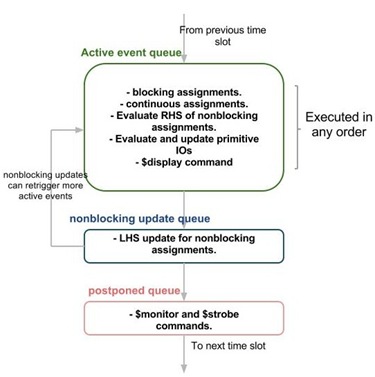In Verilog certain type of assignments or expression are scheduled for execution at the same time and order of their execution is not guaranteed. This means they could be executed in any order and the order could be change from time to time. This non-determinism is called the race condition in Verilog.
Verilog execution order:
If you look at the active event queue, it has multiple types of statements and commands with equal priority, which means they all are scheduled to be executed together in any random order, which leads to many of the faces..
Lets look at some of the common race conditions that one may encounter.
1) Read-Write or Write-Read race condition.
Take the following example :
always @(posedge clk)
x = 2;
always @(posedge clk)
y = x;
Both assignments have same sensitivity ( posedge clk ), which means when clock rises, both will be scheduled to get executed at the same time. Either first ‘x’ could be assigned value ’2′ and then ‘y’ could be assigned ‘x’, in which case ‘y’ would end up with value ’2′. Or it could be other way around, ‘y’ could be assigned value of ‘x’ first, which could be something other than ’2′ and then ‘x’ is assigned value of ’2′. So depending on the order final value of ‘y’ could be different.
How can you avoid this race ? It depends on what your intention is. If you wanted to have a specific order, put both of the statements in that order within a ‘begin’…’end’ block inside a single ‘always’ block. Let’s say you wanted ‘x’ value to be updated first and then ‘y’ you can do following. Remember blocking assignments within a ‘begin’ .. ‘end’ block are executed in the order they appear.
always @(posedge clk)
begin
x = 2;
y = x;
end
2) Write-Write race condition.
always @(posedge clk)
x = 2;
always @(posedge clk)
x = 9;
Here again both blocking assignments have same sensitivity, which means they both get scheduled to be executed at the same time in ‘active event’ queue, in any order. Depending on the order you could get final value of ‘x’ to be either ’2′ or ’9′. If you wanted a specific order, you can follow the example in previous race condition.
3) Race condition arising from a ‘fork’…’join’ block.
always @(posedge clk)
fork
x = 2;
y = x;
join
Unlike ‘begin’…’end’ block where expressions are executed in the order they appear, expression within ‘fork’…’join’ block are executed in parallel. This parallelism can be the source of the race condition as shown in above example.
Both blocking assignments are scheduled to execute in parallel and depending upon the order of their execution eventual value of ‘y’ could be either ’2′ or the previous value of ‘x’, but it can not be determined beforehand.
4) Race condition because of variable initialization.
reg clk = 0
initial
clk = 1
In Verilog ‘reg’ type variable can be initialized within the declaration itself. This initialization is executed at time step zero, just like initial block and if you happen to have an initial block that does the assignment to the ‘reg’ variable, you have a race condition.
There are few other situations where race conditions could come up, for example if a function is invoked from more than one active blocks at the same time, the execution order could become non-deterministic.




No comments:
Post a Comment
Please provide valuable comments and suggestions for our motivation. Feel free to write down any query if you have regarding this post.